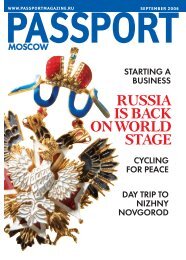A Truly Significant Holiday - Passport magazine
A Truly Significant Holiday - Passport magazine
A Truly Significant Holiday - Passport magazine
You also want an ePaper? Increase the reach of your titles
YUMPU automatically turns print PDFs into web optimized ePapers that Google loves.
M&A Transactions<br />
Daniel Klein’s Legal Line<br />
Dear Daniel:<br />
Our company is in the food processing<br />
business and we have been importing our<br />
processed goods from Western Europe and<br />
now are finding it difficult to be competitive<br />
on the Russian market. We have hence decided<br />
to purchase a company in our business<br />
sector. I have heard that buying companies<br />
in Russia is fraught with various risk<br />
factors which are unique to Russia. Can you<br />
outline what those might be?<br />
Dear Buyer:<br />
I was lucky enough to go to Davos this year<br />
and take the pulse of industry captains that<br />
have investments here in Russia. The consensus<br />
seems to be that as the ruble continues<br />
to depreciate it is translating into a boost to<br />
local investment for two reasons: lower local<br />
costs and increased importation costs of foreign<br />
made goods. Your intentions are obviously<br />
very welcome and I wish you the best<br />
of luck!<br />
If you haven’t already found this out, investors<br />
with cash are in the driver’s seat as prices<br />
have fallen sharply and buyers are now in a<br />
hurry to sell. As a result, the dynamics of mergers<br />
and acquisitions have been turned inside<br />
out creating a frenzied environment of hasty<br />
acquisitions that are often made without indepth<br />
due diligence of selling concerns. Due<br />
diligences in Russia differ from due diligences<br />
in the west as they tend to provide less accurate<br />
reading of a company’s real value and<br />
risk profile. This is a result of reduced transparency,<br />
rule of law and higher instances of<br />
fraud. Some of the general guidelines relat-<br />
ing to acquisitions which are peculiar to the<br />
Russian market are as follows:<br />
Court Records. In Russian unlike the west<br />
there is no public system relating to law suits<br />
filed and judgments so it may be quite difficult<br />
to get a full profile of a company’s judicial<br />
history.<br />
Credit Rating Agencies. Agencies like Dun<br />
& Bradsteet may exist in Russia but the system<br />
of profiling a company’s payment record is<br />
virtually non-existent. Since Russian businesses<br />
are reluctant to share information, there<br />
is no reliable resource to determine a company’s<br />
payment practices. Credit checks in<br />
the west also help assess the types of debts a<br />
company may have with its suppliers, a fact<br />
that may be completely undiscoverable in<br />
any reliable way in Russia .<br />
The Russian “Promisory Note.” In Russia,<br />
management can borrow money without<br />
establishing a documented document trail.<br />
This can come back to haunt an unsuspecting<br />
buyer.<br />
Employee Rights. If there are on-going or<br />
potential law suits by former or current employees,<br />
these issues may be difficult to determine<br />
even with the most thorough due<br />
diligence. Employee strike suits can be so<br />
severe in Russia that they can potentially<br />
cripple a company’s finances. This is more<br />
of a red flag in Russia than in other countries<br />
with freer labor markets.<br />
Reliability of a Sellers books<br />
Tax Liabilities Tax liabilities have dominated<br />
Russian headlines and have crippled<br />
Columns<br />
more large Russian companies than one<br />
can shake a stick at. Reviewing a company’s<br />
books may only reveal part of a company’s<br />
real business activity. As tax compliance is<br />
not very common in Russia, it is not that uncommon<br />
for a company to have two parallel<br />
sets of books, the so called black books and<br />
white books. During a due diligence companies<br />
with both sets of books may or may not<br />
provide all the relevant information hence<br />
leaving the buyer with a potential contingent<br />
tax liability not to mention an investment with<br />
an exaggerated valuation. Time permitting<br />
it is advisable to conduct as thorough an<br />
independent audit as possible. A buying<br />
company often does not know what he/she<br />
is buying and may find itself paying massive<br />
fines and back taxes post-transaction. It may<br />
not be useful to ask the tax authorities either<br />
since that effort alone may attract undue<br />
attention to the target company resulting in<br />
unwanted attention and audits.<br />
Seller Guarantees As the rule of law is not<br />
what it is in the West seller guarantees may<br />
not be worth the paper they are written on<br />
since bringing a law suit in Russia may not be<br />
easy, cheap, or fun. One advantage of seller<br />
guarantees in Russia is that sellers who fraudulently<br />
misrepresent what they are selling<br />
may find themselves subject to criminal action,<br />
and that can always be used as a bargaining<br />
tool if civil enforcement of a seller<br />
guarantee proves difficult. P<br />
Daniel Klein is a partner at Hellevig, Klein & Usov.<br />
His column is intended as commentary and not as<br />
legal advice.<br />
March 2009 47
















